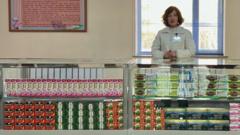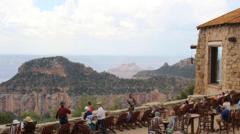The recent reintroduction of tourism to North Korea allowed a small group of British, French, German, and Australian travelers to explore the secluded nation. Guided by strict local rules, they encountered a mixture of controlled tours and glimpses of everyday life, revealing both the regime's façade and the underlying realities of the country.
British Tourists Share Insights from Their Journey to North Korea

British Tourists Share Insights from Their Journey to North Korea
After five years of isolation due to the pandemic, the first group of British tourists returns to North Korea and shares their unique experiences within the tightly controlled regime.
The local guides have to follow a strict, pre-approved schedule - which on this tour included a visit to a new, fully stocked pharmacy. "Don't insult the leaders. Don't insult the ideology. And don't judge." These are the rules tour guides read out to Western tourists preparing to cross into North Korea, known for being one of the most secretive and repressive nations. Tourists are reminded of the practical realities: no phone signal, no internet, and no cash machines.
Rowan Beard, who operates Young Pioneer Tours, said, “The North Koreans aren't robots. They have opinions, goals, and a sense of humor. We encourage people to listen to and understand them,” as he led one of the first groups back into the country after a five-year hiatus. North Korea had closed its borders at the start of the pandemic, effectively blocking all outsiders—including diplomats and aid workers—and it had become increasingly isolated, relying more on support from Russia and China.
After numerous attempts to negotiate access, Rowan and other tour leaders organized a group of excited travelers eager not to miss their chance to discover this unique destination. Their journey began last Thursday, when tourists from the UK, France, Germany, and Australia entered through the remote region of Rason for a four-night trip.
Among the travelers was British YouTuber Mike O'Kennedy, who was taken aback by the level of control enforced throughout the trip. Tourists were consistently escorted by local guides, adhering to a rigid schedule, including visits to a beer factory, a school, and the new pharmacy. “I even had to inform them when I needed to use the bathroom,” Mike shared, adding that it was unlike any travel experience he had ever had.
Despite the stringent regulations, glimpses of authentic life in North Korea emerged during their scheduled outings. Observing the productivity of locals, Mike remarked, “Everyone was working; it felt bleak to see.” Notably, a performance by a group of eight-year-olds at the school, which involved dancing to animations of ballistic missiles, left a strong impression on him.
Visitors to North Korea are currently excluded from the capital, Pyongyang, leading tour leaders like Greg Vaczi from Koryo Tours to view Rason as a testing ground for tourism. He pointed out that the area operates as a “mini capitalist enclave” where some Chinese enterprises collaborate with North Koreans and have the flexibility to travel in and out.
Travelers like Joe Smith, who has visited the country before, reflected on the complex realities of their experience. “Each visit reveals a little more but also raises more questions,” he explained. Joe's highlight was an uncharted visit to a luxury market featuring items like jeans, fake handbags, and household appliances—products likely smuggled from China. “It felt messy and real,” he said, painting a stark contrast to the pre-packaged sights typically presented to tourists.
Although the tour provided some insight into life in North Korea, the restrictions felt tighter than before, with fewer opportunities to explore or engage with locals independently. Leaders cited ongoing fears related to COVID-19 as a reason for the limited freedoms—travelers' luggage was disinfected upon arrival, body temperatures checked, and many locals were still masked.
The pandemic's impact on the nation's economy has been pronounced, with local guides echoing government claims of a swift eradication of the virus, purportedly brought in from South Korea. The reality seems far grimmer, as the Chinese businesses in the area struggle, and dilapidated infrastructure paints a bleak picture. Joe observed poorly maintained streets and dimly lit buildings, noting, “If this is the best they can show, I dread to think what else is out there.”
Interactions with local guides offered tourists a rare glimpse into the thoughts and opinions of North Koreans, who, despite the regime's propaganda, displayed surprising awareness of international events, such as U.S. tariffs and the ongoing war in Ukraine. However, discussions about sensitive topics bore the weight of a cautious atmosphere, as revealing too much could put both tourists and guides in peril.
As tourism resumes, the discussions over its ethical implications continue. Critics argue these trips mainly benefit the North Korean regime rather than the local populace, pointing out that the majority of the population remains oblivious to tourists' presence and that funds largely support the state apparatus.
One chilling moment for Mike came during his visit to the school when a child expressed hope of visiting the UK—a wish he realized was bleakly unrealistic. Such interactions highlight the deep inequalities and isolation within North Korea, propelling discussions on the broader implications of tourism in this tightly controlled society.



















